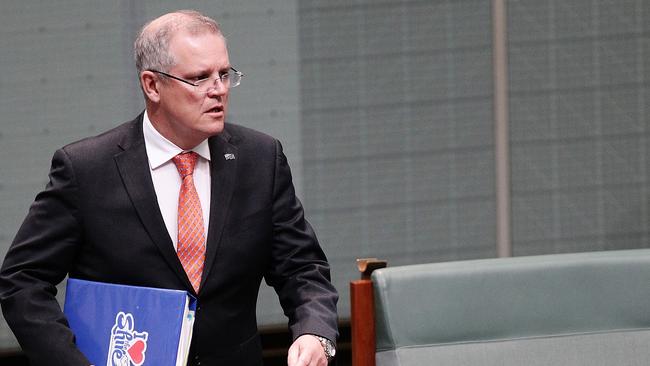Winners don’t get off Scott free

Before the ballot on Monday, Social Services Minister Scott Morrison rejected Tony Abbott’s main tactic to save his prime ministership — an offer for Morrison to run as deputy on a ticket with Abbott that meant Morrison would also be treasurer.
The Abbott camp sees Morrison’s rejection as the pivotal event that afternoon and are convinced it would have boosted Abbott’s numbers. These Abbott-Morrison talks are at the heart of rancour now sweeping the party, given Morrison’s constant statements of support for Abbott.
Morrison was not enthusiastic about Abbott’s approach, but he rejected it only after talking to Liberal deputy Julie Bishop, who had met Abbott earlier in the day to tell the prime minister he was going to be challenged. Bishop told Abbott: “You have lost the numbers in the parliamentary party and a majority of Liberal cabinet members.”
Bishop did not tell Abbott she was withdrawing her support as deputy, but he correctly assumed that. With Bishop backing Malcolm Turnbull, Abbott was crippled in political terms. He needed a trump card; it had to be Morrison.
“I’ve never sought the deputy’s job and I’ve never wanted to be deputy,” Morrison told Abbott. “You’re a loyal bloke. I don’t get it. Why are you throwing Joe (Hockey) under a bus?”
But Abbott, given the situation, was asking Morrison to have the courage of his convictions.
Morrison was first approached by an Abbott emissary. Then he saw Abbott.
As far as Morrison knew, the deputy’s job was not in play. Morrison told Abbott he would consider the proposal. Then he went to see Bishop.
“I’m not running on a ticket,” Bishop told Morrison. “There is no ticket with Turnbull.”
Bishop, like Morrison, wanted to have “clean hands”. But Bishop was pledged to Turnbull. For months, everyone has known that when Turnbull challenged, Bishop would be with him.
Bishop didn’t want a ticket because that automatically put the deputy’s job in play. Obviously, that would be contrary to her interests. But Abbott was fixated on the power realities. When he made his announcement in the evening about the partyroom meeting, he said there would be ballots for both the leader’s and deputy’s positions. He knew the reality — he faced a Turnbull-Bishop team. Bishop’s defection was predictable but critical to Turnbull’s momentum.
When Morrison returned to see Abbott, he said: “There’s no ticket against you.” This closed the circle. Morrison had found the perfect excuse. He was rejecting Abbott.
The truth is that Morrison had a lot to lose. Morrison knew he was Turnbull’s preferred choice as treasurer. He had been Turnbull’s preference since the failed spill motion in February.
The best way to prejudice this was to run as Abbott’s deputy and choice as treasurer in a ballot that Morrison expected Abbott to lose. It would be guaranteed to alienate Turnbull and Bishop. And Morrison had no wish to become entangled in a move to strike down Bishop as deputy.
The Abbott camp’s anger towards Morrison is not just his refusal to run on a joint ticket with Abbott. It is because of the relentless media projections of Morrison as having “clean hands” and being a committed Abbott supporter when he refused the decisive request to assist Abbott.
The Daily Telegraph yesterday, in the words of some Liberals, was a classic in this genre. The charge against Morrison is hypocrisy and it is being made by significant figures in the party’s conservative wing with potential long-run consequences.
In reply, Morrison has made clear he voted for Abbott in the ballot. He told Abbott in their discussions that he would vote for him. In the partyroom, Morrison showed his ballot paper to Abbott supporter Kevin Andrews to verify this pledge.
But Morrison essentially stayed out of the contest and did no lobbying. In a leadership contest, there is only one test that counts — lobbying colleagues on behalf of the leader you support. That is the authentic measure of support and Morrison didn’t do it. He let Abbott fade away.
During their talks, however, Morrison did question Abbott’s motives, saying: “You’re ready to dump Hockey so I can run with you in a ballot as deputy.”
It is misleading to assume a Turnbull-Morrison deal. The truth is, Morrison didn’t need to cut a deal with Turnbull because he knew he was getting the prize anyway.
That Morrison would be Turnbull’s treasurer has been one of the worst-kept secrets in politics this year. It is also the case that Morrison told Turnbull months ago that he wanted no part in any move against Abbott.
This is the reason Abbott was under pressure from some of his own supporters to elevate Morrison into the Treasury job — the exact argument John Howard made to Abbott six months ago.
Morrison will have the satisfaction of knowing that the leader he voted against, Turnbull, is going to make him treasurer. Why? The answer is apparent from Turnbull’s statement of reasons for the challenge. For Turnbull, the economic narrative is the problem and Morrison is the best answer.
Bishop and Morrison, after Turnbull, have finished as the big winners.

